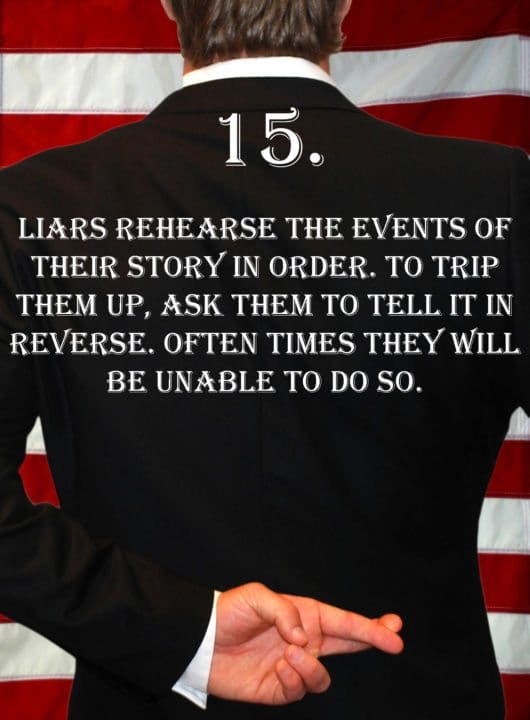
Deception Tip 99:
It can be helpful to agree with liars on little things. If they think they fooled you, they may let their guard down.
Listen To The Podcast!
E99 – Agree With Liars – Deception Tips Podcast – Click Here To Subscribe
Podcast Transcript
Hello and welcome to the Deception Tips podcast where you will learn amazing cues to detect deceit that will help you read people like never before. I’m your host Spencer Coffman, let’s get started.
Hello and welcome to Deception Tip episode number 99. Last week, we had a great topic, we talked about how pathological liars will sometimes display their truths like lies.
What that means is that when they are speaking, they’re normally lying all the time, they’re pathological liars. They tell lies like quote, unquote, normal people tell regular words or everyday conversation, they simply speak lies all the time.
Because there’s no battle between their conscious and unconscious over these lies, when they tell the truth, it becomes a little uncomfortable. It becomes uncomfortable because the unconscious doesn’t know what’s going on. It says, hey, wait a minute, this isn’t normal, this isn’t our normal behavior, what is happening?
I’m not comfortable with this, so I’m going to leak some signs to let people know that it’s not our normal behavior, that it’s not going to match the baseline. Therefore, when you’re watching or interacting with pathological liars, you may see that these signs of deception that we’ve been learning about, may be displayed when they’re telling the truth.
You’ll see that and what you’re noticing is that it’s a deviation from their baseline behavior or their normal behavior, so watch for that. Any time someone’s normal behavior changes something is going on, if they’re a pathological liar, it may be because they’re finally telling the truth.
We talked about pathological liars in a previous episode, number 94, we stated that they are not going to show all of these signs simply because they’re so used to lying.
If you haven’t listened to that one, I encourage you to do so, that was Deception Tip episode number 94 and, of course, last week was episode number 98. So, check both of those out, listen to them again and then share them with a friend.
Today, we are going to talk about another great tip, this one is more of a strategy that you can use when you are interacting with other people. It’s very valuable when you are about to get to the truth or when you feel like you’ve started to build a little bit of rapport with that person.
You’re gaining a little bit, you’re finally starting to make some headway, you’re breaking through the ice, if you will. This is something that you can use to help you get the information out of that person. It’s like a strategy of getting them to like you, agreeing with them type of a thing and moving forward and getting that information.
We’ve mentioned it several times throughout all of these episodes, we’ve also given you other tactics and strategies to use that are very important and you, hopefully, have been practicing and have been incorporating them into your conversations. We talked about one of these strategies that relate to today’s episode way back in episode number 84, and that was Relating Language.
We talked about how it’s important to get the person you’re speaking with to feel like you guys relate to each other. You can use some languages that makes them feel like you relate to them and makes them feel like they relate to you. Now, those are two different things even though we’re both relating to each other.
No, no, no, if they feel like you relate to them, it’s different than if they feel like they relate to you. It’s like if you look up to someone and if someone looks up to you, well, that’s two different things even though it’s the same verbiage explaining it. If you want some more information on that, tune in to episode number 84,
It closely relates to today’s episode because both of these tactics are working to build some rapport and relationship with the person you’re speaking to, so with that liar, let’s call it. You’re working to get them to like you more so that they let their guard down and that they will be more apt to open up and talk to you.
It’s something that doesn’t really matter if you do or don’t like them, it’s what they believe. So, you could really dislike that person but if you’re going to work with them or try to get the truth out of them then you need to pretend for a little bit. You might have to engage in a little deception yourself in order to solicit the truth out of that person.
So, here it is, this is Deception Tip episode number 99. It can be helpful to agree with liars on little things. If they think they fooled you, they may let their guard down. Here it is again, Deception Tip number 99. It can be helpful to agree with liars on little things. If they think they fooled you, they may let their guard down.
What are these little things that you should be agreeing with and what kind of lies are they? Well, there are a lot of different things that you could go along with or engage in conversation with them but the main thing is to let some stuff go. If you know that they’re lying about things that aren’t really trivial if you’re trying to find out what happened in a certain situation.
You know that they’re lying about some details in their alibi that is three hours before that situation then does that really matter? Are you going to focus your time on that lie or are you going to try to get to the part that you really want to know? That’s what I’m saying by the little things, you don’t really have to agree with every lie or with every little thing but you can let it go.
So, instead of calling out all of those lies, you may choose to look over them for now, at least. Then when you find out what you want to know, you may determine that, hey, wait a second, that might tie into what they were doing yesterday or what they were doing four hours earlier and they lied about that, let’s come back to that.
Since you have a bigger goal, you have like priority number one for finding out the truth, you’re going to pass over priorities four or five, three, and two, and all those to get to priority number one. Once you find out number one, you could circle back to the others. Remember, calling out every single lie may not always be the best idea or the best thing for you to do.
If you’re spending time in conversation calling out all those little lies, how likely is it that you’re going to get to that big one? They’re going to be exhausted, they’re going to feel like you’re not cooperating at all and they’re not going to tell you anything. So, if you’re calling out every single lie and questioning everything they say, what are the odds they’re going to want to keep talking to you? Very slim.
We talked about calling out lies and Deception Tip episode number 88, by the way. So, which lies should you focus on calling out and which should you look over? Also, how do you go about engaging in this conversation and building rapport, and getting this relationship going so that they are more apt to continue to talk to you? We’re going to find out all about it coming up right after this.
Would you like to know if you are being lied to? Lies are everywhere and it could be happening to you. A Guide to Deception is a great book filled with information on how to spot lies. Get your copy today online at spencercoffman.com.
Welcome back to Deception Tip episode number 99 where we are talking about how agreeing with liars and how letting lies go may help you get to the bigger picture or get to the bottom of the real story that you’re trying to find out. Before we took a little break, we said, how can you do this or which lies did you let go and how do you engage in this conversation to build that rapport so that people will tell you more.
Well, we’ve got some, several strategies for this, some, several strategies, that’s good, so that means there’s more than several. Remember all these episodes I’m recording on the fly, I don’t have any prepared material, it’s just right from me to you, so you’re going to hear a few slips and natural conversational pieces. Keep that in mind and hopefully, you appreciate it because it’s a little more genuine.
I’m not scripting this for you, this isn’t some polished, tailored thing that’s going right to your ears, this is the real deal. We’re really diving into each one of these tips and I’m giving you the knowledge that I have and that I’ve spent years learning. So, hopefully, you’ll appreciate that, if you do, consider leaving a review, there we go, there’s a little plug for that.
Now, diving in, you want to converse with these people, when you’re trying to get the truth from them, number one, you’ve got to let them talk. We’ve talked about this in a previous deception tip, how you allow the liars to talk or let them speak. We’ve also talked about Becoming Silent and Staying Silent.
Those were some really important tips for you as in become silent so that you create that awkward silence and then stay silent to let them talk. I’m not going to go over exactly which tip every single one is because at this point I could spend half the episode naming all of the tips that we’ve talked about.
We’ve talked about those things, those are great rapport builders, I encourage you to check them out. Check out the videos, the podcasts, or the blog posts to review your mind and refresh your memory. By allowing them to speak, not interrupting them, and being quiet really helps build that rapport because then they feel like what they’re saying matters like you actually want to listen, you’re not cutting them off.
Another thing that is important too, when they are talking, you need to be thinking about what they’re saying, not thinking about what you are going to say next. Oftentimes, as humans, we’re so caught up in being heard and letting ourselves talk and be the ones who seem so smart that when they start talking, they’re only a couple of sentences in, and already you want to reply to something in those sentences.
Therefore, you start thinking about that reply and you aren’t even paying attention to the other five sentences that they say before you reply. You say your thing and they’re like, ‘what the heck is the matter with you? I just said that I just clarified that’ and you’re like, ‘no, you didn’t’. Well, yeah, they didn’t in the first three sentences that you’re thinking about but they did after and you weren’t listening, so listen to everything, listen to their whole story.
We talked about that Entire Story, which was an episode title, let them tell their entire story. You need to let them speak and you need to be thinking about what they’re saying.
For those of you in a relationship, that is probably some of the best advice you’re going to receive. Ask anyone who’s been married for a long time, listening and conversing well is a great thing, so there’s some free relationship advice.
When you’re working with people who you’re trying to get a story with, another thing is relating to them. We talked about that, I’ve mentioned it before, rephrasing questions back to them. They said something, you’re going to take whatever they said, ‘so, you said X, Y, Z, when that happened, what did you feel like doing’ or something like that.
Bring in their feelings to it, bring in their mind or what they were thinking or what did that do for you in that situation. What were you thinking about in that situation? Ask them stuff like that or even ask them stuff about the senses.
What did it smell like? What did it sound like? Did it bring back any memories? Ask these questions that poke a little deeper into their mind, their memories, and their life.
You’re getting into their hearts with these questions, that’s what this is doing. This is poking down into their heart and retrieving things that might be important to them. It’s retrieving memories or past things that aren’t even related to what’s going on now, but you’re making them related by redirecting some kind of a question and a feeling.
What this does is, it makes them feel like you really care, maybe you do or maybe you don’t. Either way, if someone feels like you care about them and you care about what they’re saying, you cared enough to ask these questions. Let’s face it, no one really asks about how it made you feel or did it bring back any memories, or what it sounded like or tasted like, no one asks these questions.
So, when you ask them, not only is it going to be a little unusual but it’s going to arise some feelings inside of them. Wow, this is unusual, this person is strange, they care, they’re asking these questions, I’m going to answer them. By doing that, you’re developing that deeper relationship with them and you’re going to get them to be more cooperative and they’re going to feel like they like you a little bit more.
You may not believe anything they say, you may not care about anything they say but in doing this, you’re going to get to the truth, which is what you want to learn. Remember I said, you may have to engage in a little deception yourself. If you really don’t care about whatever they’re saying and you think they’re a terrible person, a low-life and you hope they go to jail.
Well, in doing all of this, you might get your wish but in this conversation, you are acting as you care or you’re pretending you care, so that would be a little deception right there. Either way, use this in those interrogation techniques, in those situations where you’re looking for the truth but also consider using it in your everyday life, for those you truly do care about.
I want to thank you for listening to this week’s episode of the Deception Tips podcast. I hope that you’ll share it with your friends, subscribe to the feed, take a look at the Deception Tips videos, the blog and check out the books I have available, and, as always, tune in next week for a new deception tip.
Video Transcript
Hey guys, my name is Spencer Coffman, thank you for watching the Deception Tips videos. They’re all about teaching you how to read people and detect deception so that you will be able to tell if someone is lying to you. Today, we are going to talk about a great tip that is something that you need to keep in mind and be aware of when you’re reading people and detecting deception.
It’s something that we may have talked about before, we’ve talked about it in a few other tips and we’ll recap on them. So, here it is, this is Deception Tip number 99. It can be helpful to agree with liars on little things. If they think they fooled you, they may let their guard down. We’ve talked about this before in getting some facts wrong or Wrong Facts and you can see that in the card above.
It’s important sometimes to agree with liars and allow them to think that they may have fooled you. If they think they fooled you, they may let their guard down like oh man, I’m getting away with this, this is way easier than I thought, this is going to be a piece of cake, let me just keep going. All of a sudden, they may just start spilling the truth like crazy.
One important thing is to not let yourself get overconfident and we’ve talked about that before, you’ll see another card come up, don’t get overconfident in this ability. If you start to agree with the liar on certain points and they are like oh yeah, I’ve got this. They start to let their guard down and you notice that and you’re like yes, I’ve got them right where I want them, they let their guard down, I’m going to walk all over them.
Don’t get overconfident because as soon as you think you have it in the bag, you’re going to lose it, you’re going to mess it up and you’ll fail. So, remain calm, remain humble, stay there, do not become overconfident. One thing to look for though is when you start to get some facts that are wrong, we talked about it, like with their name and it frustrates them.
Maybe you start to agree with them on certain points that you know are false to let them continue with their lie. They start to get a little cocky, watch for, remember we talked about this before, contempt. We talked about this in Deception Tip number 19, if you start to see contempt then you know you’ve really got them where you want them.
They have that contempt, they think you’re an idiot, they think you’re a fool, they think they’re smarter than you, you can use that big-time to your advantage. Now you can start asking them other questions and go a little deeper and push them. All of a sudden, it’s like, oh, you came out of the left field, you gave him a hook, you threw him a curveball, whatever analogy you want to use because they weren’t expecting that.
They thought they were talking to a dimwit and all of a sudden, you’ve just laid it on them and showed them that no, you really did know what was going on, you were paying attention and you read their body language. They didn’t even know it because they thought you didn’t know what was going on, remember that they may always push to get more.
If you’re starting to agree with some of the lies that they’re saying to get them to talk more, they might start to push that lie a little further. For example, maybe you are trying to figure out where someone went and they said, “Oh, I went to Texas.” “Okay, Texas, wow, I’ve never been there, have you?” They say, “No”, oh wait a minute, and they messed up.
You agreed with something, you said, oh okay, I’ve never been to Texas, you didn’t even contradict that point. You didn’t say well, I know you weren’t in Texas because it’s ten hours from here, you didn’t even contradict it, you just said, oh, I’ve never been there, have you? Maybe you’ve been there, maybe you haven’t, you just didn’t negate that point, you moved right on and turned it into a question so quickly that they didn’t even know what you’re doing.
All of a sudden, they’ve admitted to not being in Texas. You can do things like that with any scenario just keep in mind that if you agree with certain points, you don’t have to verbally agree with them like oh, so you were in Texas, that’s great, it must have been awesome there. You don’t need to do that, you can just let it go, look over it and then circle back with a question that gets them to deny that.
Oftentimes, when you move quickly and smoothly like that, they aren’t even going to know what’s happening and they will admit to it or fess up or contradict themselves. This allows you to just say hey, you messed up, I just caught you in this lie, what do you want to say now? They can either tell you the truth or they’ll keep lying, sometimes they may push for more to see how much they can get away with. Other times, they may tell you the truth right then and there, so use this tactic to your advantage.
So, if this is your first time watching these videos, I’d love to have you subscribe to the channel on YouTube. Feel free to comment with any questions you may have as well. Also, if you’d like some more information, we have books, podcasts, and blog posts all available on spencercoffman.com that are dedicated to teaching you exactly what every body is really saying.
Until next time.






